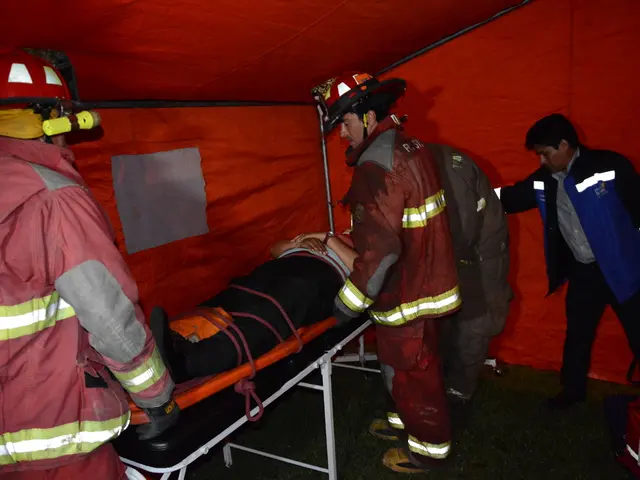The Geratars propose initiating a elder care treatment program to maximize help for seniors.
In response to the swiftly aging population, Dr. Julia Chabot, the new President of the Quebec Association of Geriatricians, advocates for a shift in healthcare approach. She envisions the implementation of a first Quebec geriatric program, an idea met with positivity by Minister Sonia Bélanger.
Chabot emphasizes the importance of geriatricians, who treat elderly patients grappling with complex health issues such as chronic or neurodegenerative diseases. Yet, the Province of Quebec falls short, with only 148 geriatricians available, as opposed to the required 211.
To facilitate coordinated care, Chabot puts forth the concept of "pivot nurses" in geriatrics. These nurses would serve as reference professionals, guiding elderly patients through the healthcare system and coordinating essential services. If, for example, a senior had mobility issues, pivot nurses could arrange for a visit from a physiotherapist or occupational therapist. Moreover, they could evaluate the need for home support in specific situations.
The proposed Quebec geriatric program might also oversee the "geriatric responder" initiative. This project aims to provide support to first-line caregivers, enabling them to manage complex cases more effectively and prevent unnecessary emergency room visits or hospitalizations. Four pilot projects are set to launch in various regions, with a goal of extending this service across Quebec by 2026-2027.
Minister Sonia Bélanger acknowledges the need for more geriatricians and is open to the establishment of a Quebec geriatric program. She emphasizes the importance of fostering relationships between first-line caregivers and specialists located in university centers.
Nurse training, more broadly adapted to the realities of aging and the needs of elderly patients, represents a key component of Chabot's proposed program. This focus aligns with the government's 2024-2029 action plan, titled "The Pride of Aging," which aims to enhance living conditions for seniors.
Chabot's vision for the program emphasizes a more medical and care-centric approach, complementing the broader goals of the government's action plan. Other issues on the horizon for the aging population include social inequalities due to car dependency and the need for advanced research in the field of aging. The rapid expansion of digital health technology and social innovation presents promising solutions to many of these challenges.
- Dr. Julia Chabot proposes a shift in healthcare approach, focusing on the integration of a first Quebec geriatric program.
- Chabot emphasizes the role of geriatricians, who specialize in treating elderly patients with complex medical conditions, such as chronic diseases and neurodegenerative disorders.
- The Province of Quebec is currently short on geriatricians, with only 148 available versus the required 211.
- Chabot suggests the concept of "pivot nurses" in geriatrics, acting as reference professionals guiding elderly patients through the healthcare system.
- Pivot nurses would coordinate essential services, such as arranging for physiotherapists or occupational therapists in seniors with mobility issues.
- Evaluating the need for home support in specific situations is another task that pivot nurses would perform.
- The Quebec geriatric program could oversee the "geriatric responder" initiative, designed to support first-line caregivers and manage complex cases more effectively.
- Minister Sonia Bélanger supports the establishment of a Quebec geriatric program and the geriatric responder initiative.
- Bélanger highlights the importance of fostering relationships between first-line caregivers and specialists located in university centers.
- Nurse training adapted to the realities of aging and the needs of elderly patients is a key component of Chabot's proposed program.
- This focus aligns with the government's 2024-2029 action plan titled "The Pride of Aging," which aims to improve living conditions for seniors.
- Chabot's vision for the program encompasses a more medical and care-centric approach, complementing the broader goals of the government's action plan.
- In addition to addressing the needs of elderly patients, addressing social inequalities due to car dependency and the need for advanced research in the field of aging are issues on the horizon for the aging population.
- The rapid expansion of digital health technology and social innovation presents promising solutions to many challenges faced by the aging population.
- Addressing issues such as skin conditions, eye-health, hearing, and other aspects of health and wellness is critical for older adults, particularly in light of chronic diseases like chronic kidney disease, COPD, type-2 diabetes, and cancer.
- This includes the importance of fitness and exercise, mental health, mens' health, womens' health, multiple sclerosis, migraines, cardiovascular health, autoimmune disorders, neurological disorders, rheumatoid arthritis, psoriasis, therapies and treatments, and skin-care, as well as addressing sexual health, Alzheimer's disease, and breast cancer.








